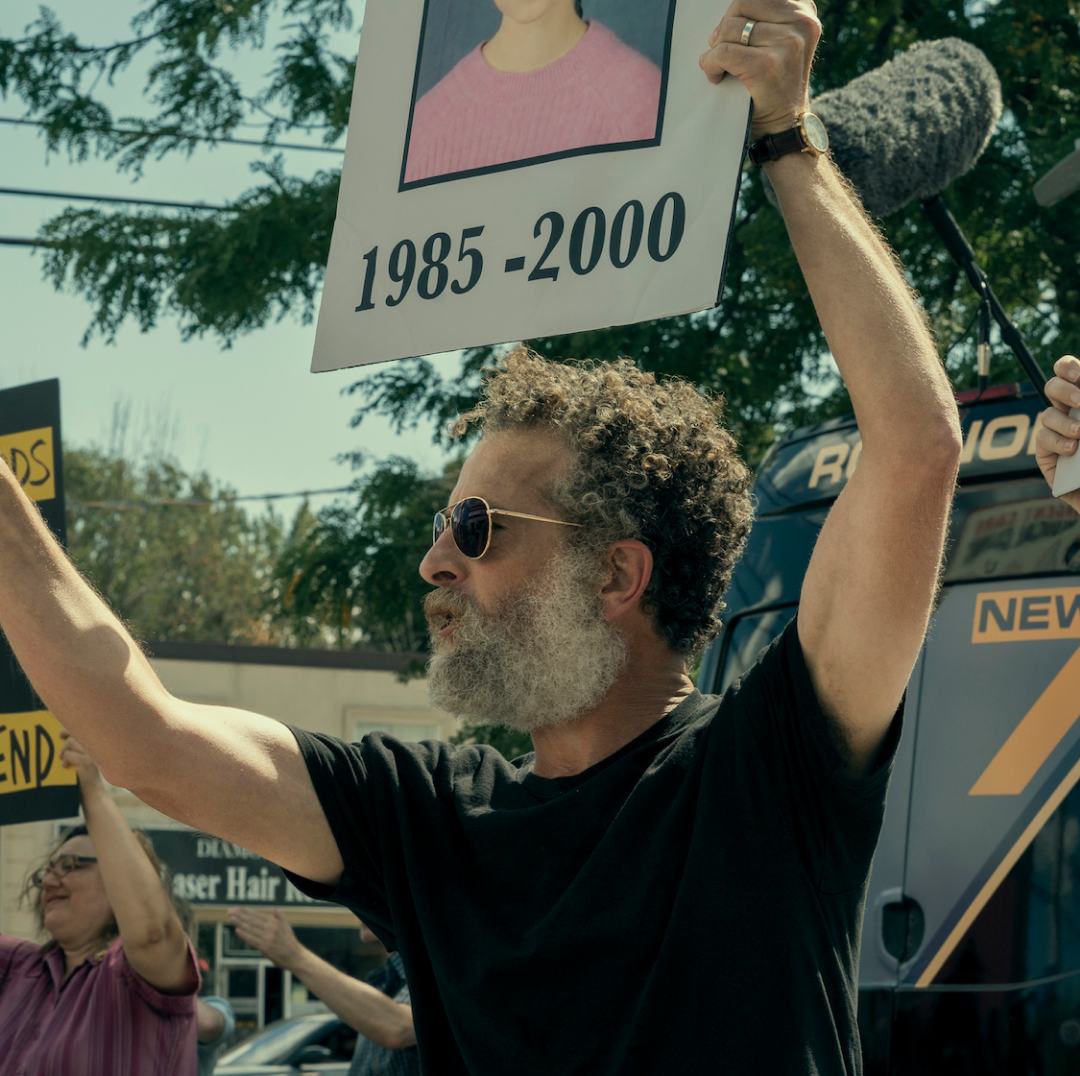
The latest scripted true-crime series has arrived, offering a fictionalized retelling of the opioid epidemic from top to bottom. Painkiller is Netflix's latest star-studded limited series, adapted from the nonfiction book Pain Killer by Barry Meier, and the New Yorker article “The Family That Built an Empire of Pain” by Patrick Radden Keefe. The six-episode show follows Purdue Pharma and the development and release of the drug OxyContin, which was followed by a massive increase in the use and abuse of opioid drugs. In addition to depicting major moments in the drug's timeline, the series also addresses the public health crisis by exploring the victims and families who were devastated by the epidemic, the middlemen who connected Purdue Pharma to doctors, and the investigators working to get justice against the billionaire family behind the company.
To tell the story of Painkiller, the miniseries utilizes both fictional depictions of the top executives at Purdue, and composite characters representing hundreds of thousands of people affected by the crisis. “Even the fictionalized elements of this show are grounded in the knowledge that the painful repercussions of opioid addiction are playing out across America every day,” says executive producer Eric Newman in the press notes. “That’s what lies at the heart of Painkiller; trying to understand how this all started, so that we can maybe finally stop it.”
Read on for a breakdown of the true story behind Painkiller, from the real-life inspirations behind each of the show's characters, to the fate of Purdue Pharma and the Sackler family today.
Is OxyContin still on the market?

In 1995, the Us Food and Drug Administration (FDA) approved the application for OxyContin, a controlled-release painkiller developed by Purdue Pharma. Known colloquially as Oxy, the drug was released the following year and billed by Purdue as being less addictive than other opioids. A claim included on its official label read, “Delayed absorption, as provided by OxyContin tablets, is believed to reduce the abuse liability of a drug.” Oxy became one of the most prescribed narcotics in the country, counting around $1.1 billion in sales in 2000, and brought immense wealth to Purdue’s president Richard Sackler (played by Matthew Broderick in the series), and the Sackler family. It also became one of the most abused pharmaceutical drugs in U.S. history; 300,000 people died from overdoses involving OxyContin and other opioids between 1999 and 2015.
Painkiller explores the top-level decisions that brought such an addictive substance to market, following the efforts of Richard Sackler and several Purdue executives, as well as several regulators and prosecutors involved in key events along the drug’s timeline. While the show's depiction is fictionalized, former FDA medical officer Curtis Wright (played by Noah Harpster) did leave the government agency in 1997 after he led the approval process for OxyContin. One year after he left, Wright received a position at Purdue Pharma, with a first-year compensation package of $400,000, per Insider. Another notable figure is Jay McCloskey, a former U.S. Attorney for Maine who, in February 2000, publicly sent a letter to doctors to warn them of the increasing dangers of OxyContin abuse. After he retired from his government post in 2001 to start a private practice, he served as a paid consultant for Purdue until 2004.
Changes to OxyContin’s marketing were finally made in the early 2000s, after the opioid epidemic became national news and the company began to face numerous lawsuits. In 2001, the FDA removed the “delayed absorption” claim and put a “black box warning” on the bottles, signifying that the drug has “serious or life-threatening risks.” The first federal investigation into Purdue Pharma was launched in 2002 in Virginia, focusing on the company’s claims regarding the drug’s potential for abuse, and their marketing practices centered on those claims. This investigation is included in Painkiller, and Purdue did in fact hire Rudy Giuliani as one of their attorneys. In 2007, the company reached a plea agreement, and Purdue was fined $634.5 million for criminally misbranding OxyContin. Though this is where Edie's story ends, the Virginia investigation was just the first in a wave of lawsuits that would hit Purdue throughout the 2010s. In September 2019, Purdue filled for bankruptcy while facing over 2,900 federal and state at the time, 628 of which named the Sacklers directly, per New York Times.
While Purdue Pharma is in the midst of a long court battle surrounding their bankruptcy (more on that later), the drug OxyContin is still in use, with much stronger regulations. In 2010, Purdue reformulated the drug with the intent of making it more difficult to solubilize or crush, with the aim of deterring abuse. (Multiple studies have found that after the reformulation, many misusers of OxyContin turned to heroin.) Oxycodone is still used to treat patients who are suffering from moderate to severe pain resulting from injuries and conditions including bursitis, neuralgia, arthritis, and cancer.
Are Glen Kryger, Shannon Schaffer, and Edie Flowers based on real people?

While many of the show’s characters are based on real people, most notably the members of the Sackler family and executives at Purdue Pharma, Painkiller also utilizes fictional characters to show every corner of the opioid crisis. Glen Kryger, played by Friday Night Lights’ Taylor Kitsch, represents members of the general public who became addicted to OxyContin. Glen’s doctor prescribes the pain medication following a workplace accident, and the mechanic and tire shop owner eventually develops a substance use disorder that brings turmoil to him and his family. While Glen is a fictional character, each episode of the series begins with testimonials from real-life people whose loved ones died due to OxyContin addiction and abuse.
Meanwhile, Shannon Schaffer, played by West Duchovny (yes, David Duchovny’s daughter), is based on the real experiences of sales representatives who sold OxyContin to doctors. Shannon is a naive college grad when she’s recruited by Britt (Dina Shihabi), and the new recruit quickly rises in the ranks of the salesforce by adopting their tactics, though Shannon does notice when some practices seem unethical. In an interview with Elle, Duchovny admitted that to portray the role, she had to reconcile with the “mental gymnastics” Shannon went through to convince herself that her job wasn’t harmful. “I just think it’s such a lesson in the stories, and narratives, that we make up to let ourselves go to sleep at night,” she told the outlet.
Then there’s Edie Flowers, a dedicated investigator in the U.S. Attorney’s office in Roanoke, Virginia, who comes across OxyContin in the midst of another investigation. Portrayed by Uzo Aduba, the attorney is the compass of the show both morally and from a storytelling perspective, as the series is guided by her testimony to a new set of investigators going after Purdue. She’s also a composite for the early prosecutors and law enforcement officers who saw the opioid crisis slowly take over their communities, as she’s based in Virginia, one of the Appalachian states which were most affected by the epidemic. As the series goes on, Edie brings a case against Purdue Pharma alongside her boss John Brownlee, who’s played by Tyler Ritter. Brownlee does have a direct inspiration, as the character’s based on the real U.S. Attorney for the Western District of Virginia, who began investigating Purdue in 2002.
What has happened to the Sackler family?

In October 2020, Purdue Pharma agreed to plead guilty to criminal charges in regard to its marketing of OxyContin, in a settlement that imposed damages of roughly $8.3 billion, per New York Times. Purdue admitted to defrauding federal health agencies and violating anti-kickback laws, as well as using aggressive marketing tactics to convince doctors to unnecessarily prescribe opioids, and marketing opioids to doctors whom it suspected were writing illegal prescriptions. Despite the monetary penalties marking the largest ever imposed on a pharmaceutical manufacturer, it was unlikely that the company would have to pay the full amount. By the time of the federal settlement, Purdue had already sought bankruptcy protection, and creditors usually end up collecting much less than what they are owed in bankruptcy proceedings.
In September 2021, an N.Y. bankruptcy court approved a settlement plan that would release the Sacklers from any future opioid-related liability, with the family paying $4.5 billion in penalties, ending thousands of lawsuits brought by state and local governments, tribes, hospitals, and individuals. The deal was widely criticized and several states appealed the ruling, with Washington State attorney general Bob Ferguson saying that it allowed the family “to walk away as billionaires with a lifetime legal shield.” The settlement was overturned in December 2021 and later upheld in an appeals court decision in May 2023 appeals court decision, which brought the payments up to $6 billion. However, this Thursday, the Supreme Court stepped in and issued a temporary block on the bankruptcy settlement in response to an objection from the Justice Department, with the government arguing that the deal allowed the billionaire Sackler family to take advantage of legal protections meant for debtors in “financial distress.” The Supreme Court justices will hear arguments in December to decide whether the settlement is authorized by the U.S. bankruptcy code, per NYT.
For now, the Sacklers are still an extremely wealthy family, with an estimated fortune of $11 billion as of September 2021. Members including Richard Sackler are expected to remain very rich if the bankruptcy deal goes through, as the $6 billion would be paid through investment returns, sales of overseas companies, and profits from the company that will rise from the ashes of Purdue. (The family would not be involved in the new company, Knoa Pharma, which will manufacture OxyContin as well as opioid-reversal medications.) The Sacklers' reputation has arguably been hit more than their pockets, as several academic, medical, and cultural institutions have removed the Sackler name from their buildings in the past several years. (See the excellent 2022 documentary All the Beauty and the Bloodshed, which followed Nan Goldin’s crusade to get institutions including the Met, the Tate, and the Louvre to cut ties with the Sacklers.) Whether Richard Sackler and other family members will also face personal liability is now up to the highest court in the land.
If you or someone you know is seeking help for substance use, call the SAMHSA National Helpline at 1-800-662-HELP (4357).







